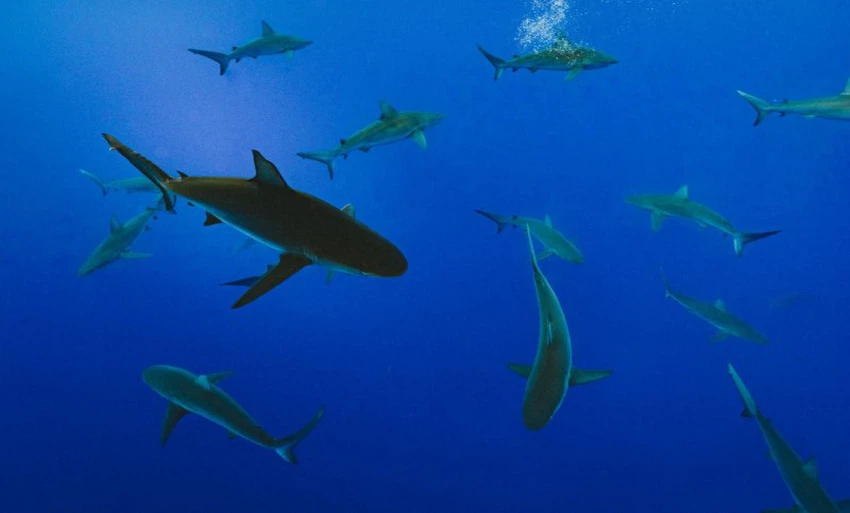White sharks threaten California beaches
ArabiaWeather - As a result of rising water temperatures in the oceans, white sharks are swimming northward, away from the west coast of the United States, posing a threat to local ecosystems.
Increasing temperatures due to climate change in California's coastal waters have led to a greater spread of small white sharks in northern regions than usual. These fish are usually found only in northern regions from southern California to the north, but now numbers have been monitored. Excessive ones in Monterey Bay, central California.
Marine ecologist Salvador Jorgensen, who works at California State University Monterey Bay, told AFP that they had spotted "the sudden appearance of sharks of a much smaller size than have been seen here before."
He pointed out that with the rise in ocean temperatures; Phenomena such as El Niño and heat waves have caused many marine species to shift their ranges northward, toward areas that were previously considered colder in historical terms.
Who are white sharks?
White sharks , also known as great sharks, are considered one of the largest types of sharks in the world, reaching 20 feet in length and weighing up to 5,000 pounds . These fish are warm-blooded fish, meaning they are more They are sensitive to cold water, and prefer to live in more moderate temperatures off the coast. As water temperatures rise due to climate change, these large fish are moving north in search of suitable living conditions.

The impact of climate change on white sharks
All living organisms have a temperature range within which they can survive, but they need a temperature that enables them to best adapt to their environment.
An example of this points out Associate Professor in the Laboratory of Predator Ecology and Conservation at Florida International University, Yannis P. Papastamattiou, points out that climate change is causing temperatures in northern regions to rise, making them uninhabitable for animals so that they are now much warmer. For example, white sharks are considered warm-blooded (i.e. have a warm body temperature) , and with Therefore, it prefers to live in ideal temperatures in order to perform optimally, although it absorbs heat less compared to some other organisms, but it has been observed in the north among small white fish.
Marine ecologist Salvador Jorgensen pointed out that as ocean temperatures rise; Due to phenomena such as El Niño and heat waves , many marine species have changed their ranges northward, towards areas that were previously considered colder in historical terms.
Do sharks on California beaches threaten human lives?
Answer: As a result of the northward movement of small sharks, they may find themselves swimming off the coast of beaches that are usually devoid of sharks, increasing the possibility of interactions between them and humans. However, the impact of sharks on humans is still unclear.
Professor Colum Brown, a shark expert at Macquarie University, told Newsweek:
“The impact of this new distribution will depend largely on where humans are located and how quickly they move.” He added: "Will this new distribution affect major cities? The interaction between humans and sharks requires consideration of both aspects: an increase in the number of people in the water and an increase in the number of sharks in the water could lead to an increase in bites."
Impact of white sharks on the food chain
Jane Williamson, associate professor of marine fisheries ecology at Macquarie University, told Newsweek:
“Rising numbers of small white sharks in northern regions could threaten unsustainable prey hunting and movement to new locations where prey is less common.” “Since otters are abundant in these areas, we can reasonably expect an increase in white shark capture rates for these species.”
These changes have indirect impacts on the entire food chain in the coastal ecosystem. For example, otters usually depend on hunting sea urchins as part of their diet. If there are fewer otters as a result of small sharks moving north, the sea urchins will be less vulnerable to being hunted by sea otters and will begin to eat kelp on the coast infrequently, which could eventually lead to the destruction of critical habitat. It is used by many marine species as a shelter and food source.
In this context, Williamson said:
“It is difficult to predict long-term impacts on these ecosystems at this stage.”
“To better understand the potential consequences, long-term monitoring such as tagging sharks and their prey should be carried out.”
Also know:
Climate change | Last September was the hottest climate record in the world
Can geoengineering contribute to a solution to climate change?
Sources:
Arabia Weather App
Download the app to receive weather notifications and more..



